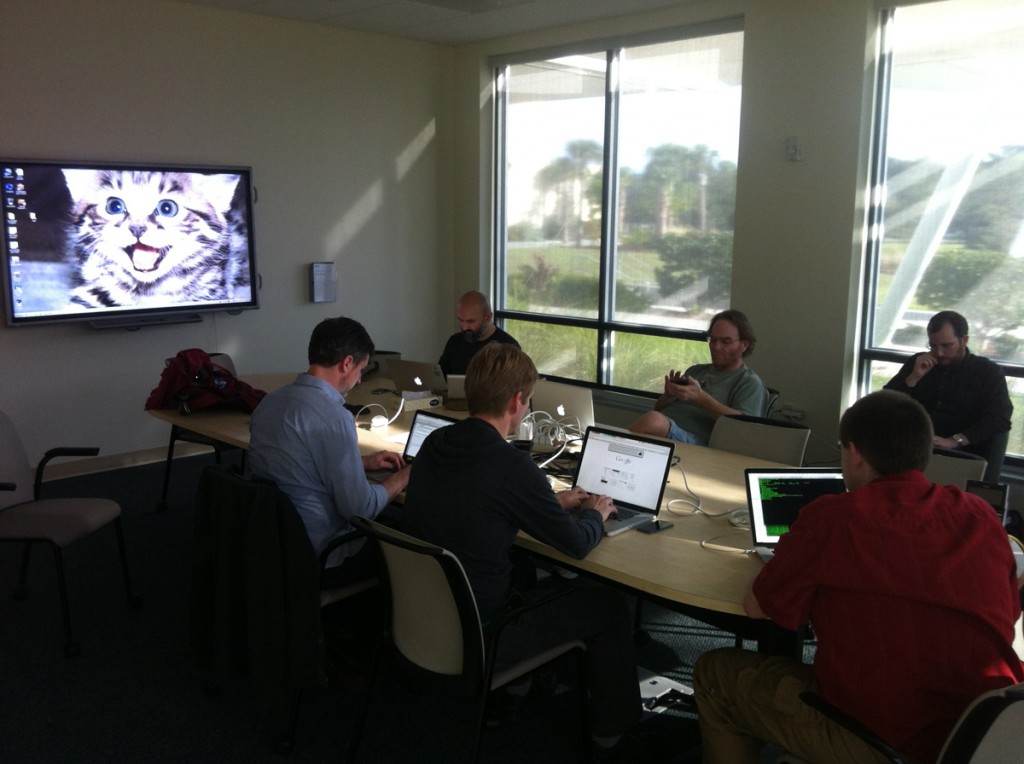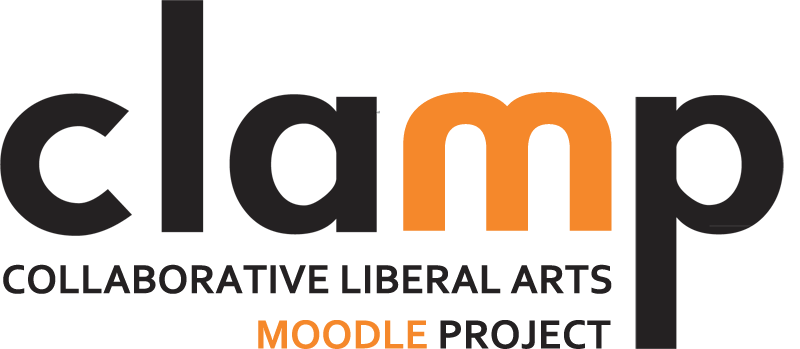Everyone talks about collaboration in higher education. Moodle Hack/Doc Fest is where CLAMP does collaboration.
Held in January and June of each year at one of our member schools’ campuses, the free event brings together developers, instructional technologists, and others with a keen interest in Moodle for three intense days of conversation, problem-solving, and experimentation with the learning management system.
We find bugs. We write code. We test new features. We bring our college’s biggest challenges to Hack/Doc with the knowledge that we’ll be working with a community that has an excellent chance of knowing how to solve them.
Moodle Hack/Doc Fests follow an unconference model without a rigid session schedule. Going into an event we identify a few key tasks we intend to accomplish, but priorities can change at Hack/Doc based the needs of attendees and problems we uncover during our research and testing.
An Opportunity for Conversation
While the bug-fixing and feature-development have always played a central role in the organization, Hack/Doc Fests are about much more than kicking the tires on Moodle.
Instructional technologists working through a new Moodle feature naturally begin discussing pedagogical best practices and how to best optimize that feature at their colleges. Lunch is an opportunity to showcase work and get constructive feedback from a small group of interested peers.
Programmers learn how to identify, fix, and submit bugs to Moodle core, but also discuss strategies for the care and feeding of their instances, best practices for automating enrollments, and new ways of managing and deploying code.
Although the name implies a division, hackers and doc’ers frequently come together to discuss aspects of Moodle such as ideas for improving an interface, new functionality to solve a common problem back home, or rousing debates on how grading methods should work versus how they do work.
Contributing Code, Improving Documentation

CLAMP’s approach to contributing code and improving documentation is simple: whenever possible, contribute back to the community.
If we identify and fix a bug at Hack/Doc, we contribute that code — as well as its supporting documentation — back to Moodle core through Tracker. If we see a need for new documentation, we first see if that documentation is appropriate for MoodleDocs. If it is we review what Moodle HQ has written and then work to improve it.
It’s only when we’ve developed a fix or feature that Moodle core won’t incorporate that we look to include it into our own Moodle: Liberal Arts Edition. The same is true for documentation — if the documentation is of particular interest to liberal arts colleges and not the general Moodle audience, we’ll consider posting it to our website.
These are the exceptions. Wherever possible we want to give back to the larger community.
Anatomy of a Hack/Doc Fest
An online orientation is held approximately a month before Hack/Doc to discuss potential projects, verify credentials, and answer questions about the event.
The Hack/Doc begins with a code & documentation sprint held the day before Hack/Doc. This is a chance for folks to get together and work on special projects of particular interest to them — a new module they’ve been experimenting with, a course design they wanted to try out, and that lingering documentation that they never got a chance to write at campus,
Moodle Hack/Doc Fest follows. The first two days run from 9 a.m.-5 p.m., with a break at noon for lunch and short ad hoc presentations by attendees. The presentations typically focus on projects people have been working on at their home institutions or research they’ve done at Hack/Doc. Small group dinners are typically held on the first day of Hack/Doc and provide an opportunity for attendees to continue their conversations over a meal. The final day runs from 9 a.m.-2 p.m., with attendees usually leaving between late morning to early evening.
Moodle Hack/Doc Fest is a free event hosted at one of CLAMP’s member organizations. Participants pay their own transportation, lodging, and food costs. The host school provides the facilities — typically two or three small conference rooms — and a light breakfast and lunch on each day of the event. CLAMP reimburses the host institution up to $1,500 of conference expenses.
The Winter Hack/Docs are typically held during the first week of January in warmer, less snowy locations to avoid weather-related cancellations and delays.
Summer Hack/Docs take place between the second and fourth weeks of June. CLAMP attempts to rotate the location of the Hack/Docs on a regional basis (East, Midwest, West) to maximize members opportunities to participate.
Travel Grants
CLAMP provides grants to support travel to its Hack/Doc events. The purpose of these grants is to encourage new CLAMP participants to attend a Hack/Doc, meet their colleagues in Moodle support roles and contribute to our shared work.
CLAMP will reimburse an applicant’s institution for travel costs of up to $500. CLAMP will make three grants available for each Hack/Doc event (for a total of six grants per year).
Visit the News and Events page for a list of upcoming Hack/Docs. Institutions interested in hosting an upcoming Moodle Hack/Doc Fest should email info@clamp-it.org.
